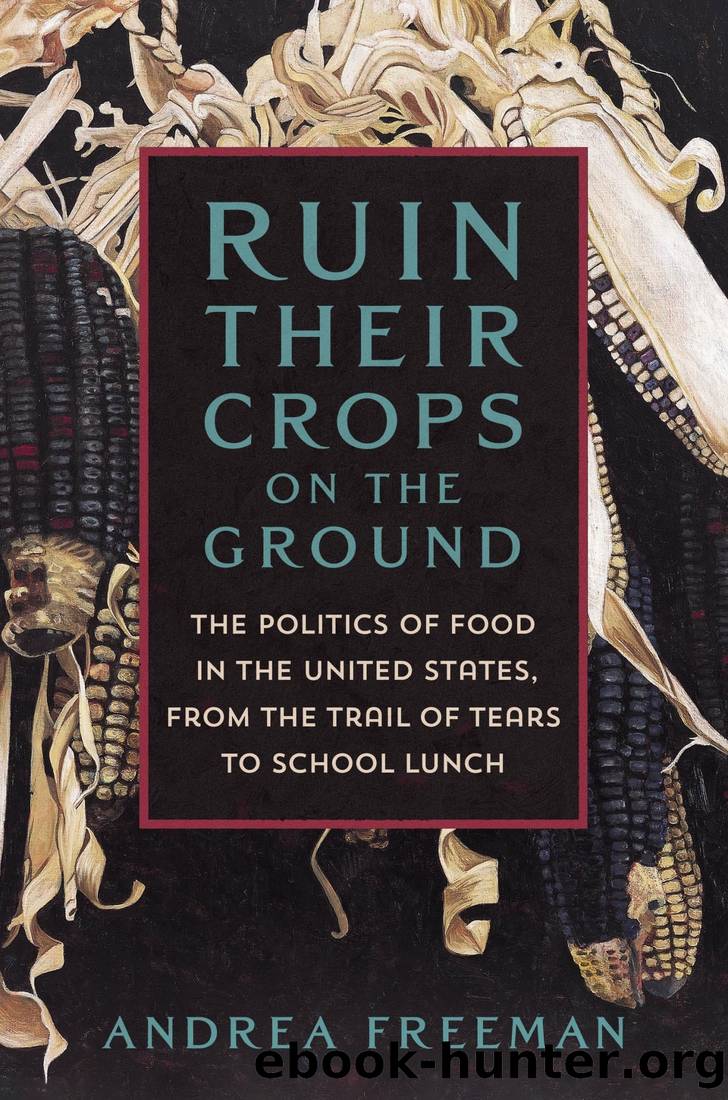Ruin Their Crops on the Ground: The Politics of Food in the United States, From the Trail of Tears to School Lunch by Andrea Freeman

Author:Andrea Freeman [Freeman, Andrea]
Language: eng
Format: epub
Tags: Political Science, Public Policy, Agriculture & Food Policy, History, United States, General
ISBN: 9781250871046
Google: Q5HXEAAAQBAJ
Amazon: 1250871042
Publisher: Metropolitan Books
Published: 2024-07-16T00:00:00+00:00
* * *
ALONG WITH BEING treated as depositories for cheap commodity foods, students receiving school lunches often have to endure their peersâ ridicule. At some schools, just eating in the lunchroom can make you a target. âThe cafeteria was for the poor kids. The food there was gross. Kids who did not eat in the cafeteria were embarrassed to go into it during lunch for fear that others would think they were getting free or discount lunch.â24 At one school, âwhite kids ate upstairs and Mexicans ate downstairs.â The National School Lunch Act directs schools not to identify students who get free lunch,25 but their meal systems make it obvious. Up to one-third of public high schools have separate lines, stations, floors, or rooms for students who get free lunch, often for ease of service or accounting purposes. Others sell school lunches and competitive foods in different locations.
Sociologist Janet Poppendieck shares two of her UC Santa Cruz studentsâ observations about their school lunchrooms: âThere was the cafeteria line, mostly filled with Hispanic kids with lunch tickets. Then there was the food area adjacent and that sold cookies, bagels, sodas, brand name ⦠expensive items.â âThose who were provided with lunch ⦠were the only ones who actually ate the school food.⦠There was also a separate door for them to go to, to receive their lunch, and they had to eat in the cafeteria because the school dishes and trays were not allowed outside.â26
Seventy percent of Texas public school students receive free lunch. In Free Lunch, Rex Ogleâs award-winning middle school memoir, he writes about the struggles he endured as a poor Latino boy in Texas trying to hide his free lunch status from his friends.
One time, I wrote down my name and âFree Lunch Programâ on paper. I handed it to the cashier, hoping she would read it, and no one around me would hear. But she said, âOh, honey. I forgot my glasses at home. Can you read it to me?â So that didnât work. Last week, I tried to wait to be the last student in line. No matter how many times, I said, âYou can go ahead of me,â there were more students. I ended up with only two minutes to eat my food before the bell rang.
Today, I have a new idea. When I get to the register, I point to the red folder and say, âPage 14. Rex Ogle.â The cashier nods. Even though sheâs slow âcause sheâs old, itâs still faster than most days. She gets the red folder, finds the page, and puts the check next to my name. It takes a second to realize it worked. I did it. I feel awesome. I didnât have to say itâthose words I hate, the ones that make me feel like a beggar: free lunch. My joy lasts maybe two seconds. As I walk away, the students behind me ask, âWhatâs in the red folder?â I donât look back. Instead, I duck my head and run until Mr.
Download
This site does not store any files on its server. We only index and link to content provided by other sites. Please contact the content providers to delete copyright contents if any and email us, we'll remove relevant links or contents immediately.
The Secret History by Donna Tartt(19058)
The Social Justice Warrior Handbook by Lisa De Pasquale(12187)
Thirteen Reasons Why by Jay Asher(8894)
This Is How You Lose Her by Junot Diaz(6877)
Weapons of Math Destruction by Cathy O'Neil(6267)
Zero to One by Peter Thiel(5789)
Beartown by Fredrik Backman(5737)
The Myth of the Strong Leader by Archie Brown(5500)
The Fire Next Time by James Baldwin(5432)
How Democracies Die by Steven Levitsky & Daniel Ziblatt(5216)
Promise Me, Dad by Joe Biden(5144)
Stone's Rules by Roger Stone(5081)
A Higher Loyalty: Truth, Lies, and Leadership by James Comey(4954)
100 Deadly Skills by Clint Emerson(4921)
Rise and Kill First by Ronen Bergman(4780)
Secrecy World by Jake Bernstein(4743)
The David Icke Guide to the Global Conspiracy (and how to end it) by David Icke(4709)
The Farm by Tom Rob Smith(4502)
The Doomsday Machine by Daniel Ellsberg(4485)
